Why AI-powered marketing is still a fantasy for most brands

Over the years, broadcast media like television and radio have made mass communication the norm. From nationwide advertisements to recurring commercials, marketers adopted a universal approach when it came to reaching out to their customers.
Yet in today’s digital era, customers crave authenticity from the brands that they interact with. While they may theoretically know that the company interacts with millions of other customers, they want to feel that their relationship with the brand is unique.
Typically, businesses have addressed this trend by personalising communication through the segmentation of customer data. In email marketing, for example, many marketers will dispatch emails based on the customer group that the individual belongs to. Whether it’s a repeating customer, a hesitant buyer, or a long term browser, businesses will segment the market based on customer data then rely on rule-based triggers in order to offer a relevant and authentic customer experience.
Businesses that do this have achieved higher ROI, either via personalised product recommendations or targeted promotions. Amazon, for example, has generated approximately 35 per cent of its revenue from onsite and email product recommendations.
Yet while such methods of personalisation have been effective thus far, many marketers recognise that true personalisation in the future will involve tailoring each shopping experience to individual customers.
14 per cent of brands don’t send a welcome email
AI-powered machine learning algorithms will enable retailers to leverage individual customer data to customise the timing, content, and frequency of the message that they are trying to send. AI algorithms are trained on huge data sets which include data on past behaviour, activity, and purchase history to create personalised recommendations for customers.
In light of this, marketers will still need to have a clear plan for the collected data, and not simply rely on a machine to sift through information for them. As algorithms can only do what they are programmed to do, the human aspect is still crucial when it comes to successful marketing campaigns and great customer experience.
For marketers, AI can open a whole new world of possibilities. However, the problem is that a large slice of companies are nowhere near being able to introduce AI to their businesses.
For most marketers, AI is not the next step – nor the second or third. As we found in our latest Hitting the Mark benchmarking report, many brands are failing to migrate beyond basic marketing automations, with just 40 per cent using abandoned cart email programs and 14 per cent failing to send the most basic of programmatic campaigns: the welcome email.
Future of AI-powered marketing
While some may still fear the restructuring and costs these changes may bring, we can’t deny that many are also excited by the power of AI. The vast amount of data combined with the power of a machine that can process and understand them will create a new level of granularity never seen before. As a result, marketers will better comprehend market segmentation and customer preferences, while being able to provide a tailored customer relationship and engagement.
The arrival of digital technologies has clearly indicated a shift in the marketing landscape. In addition to AI, now companies are able to adopt virtual assistants and other solutions to help offer a better customer experience.
Personalised communication is definitely one of the key elements to successful marketing and AI is clearly the next big step to true personalisation – but widespread adoption still feels very far away.
Tink Taylor is the founder and president of dotmailer & dotdigital Group PLC (founded in 1999). He has 20 years’ experience with digital communications and has been pivotal in the development of digital marketing in the UK and the US.
Comment Manually
You must be logged in to post a comment.

No comments